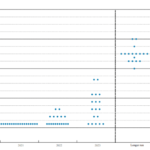China’s bitcoin mining crackdown has led to Bitmain halting mining rig sales, exodus of miners and decline in the hash rate.
Bitmain Technologies, the world’s largest manufacturer of bitcoin mining rigs, is halting global spot sales of its machines to aid the secondhand market for rigs in China, according to Bloomberg.
Today, Bitmain told the local mining community that the company’s decision is a product of the recent price plunges of new mining equipment. Since April, top-tier bitcoin mining rigs in China have been priced down by 75%, fueled by Chinese miners going offline after the country’s recent crackdown on bitcoin.
By halting sales, Bitmain claims it can help miners targeted by Chinese authorities to get better prices for their machines when exiting the industry. And in the long run, the mining rig maker giant could also benefit if the reduced supply ends up triggering a price increase for new rigs.
Last month, China’s state council stated that the country should act on a renewed crackdown on bitcoin mining and trading. Since then, local governments have been targeting bitcoin miners with shut down orders and inspection notices, a priori in fossil fuel-powered energy plants only.
More recently, however, bitcoin mining operations in provinces with renewable energy sources have also been targeted. Miners in the Sichuan province, for instance, have also fallen prey to the widespread crackdown. The region’s hydropower grid, a park initially set up by the government to attract energy-intensive industries to utilize excess energy produced in the rainy seasons, had become a hotbed for bitcoin mining farms but is now dismissing them.
Insider Information Claims “Great ASIC Exodus” Is Underway
China’s crackdown on bitcoin mining activities has compelled companies to reconsider their business strategies. BIT Mining, for instance, is now applying an “overseas deployment strategy.” The owner of the BTC.com pool has already delivered the first of three batches of mining equipment to Kazakhstan, where part of its operations will be housed going forward.
Kevin Zhang, vice president at bitcoin mining-focused firm Foundry, tweeted that BIT Mining’s move represents an upcoming trend of hash rate transfer away from China — which he calls the “great ASIC exodus.”
According to Zhang, who claims he has been in touch with leaders in the Chinese bitcoin mining sector, industry insiders estimate that around 70% of China’s bitcoin mining capacity has already gone offline. And the prediction is that nearly 90% of the hash rate in the country might be off-grid by the end of the month.
“In the most extreme cases,” Zhang tweeted, “some colleagues in Kangding, Sichuan have been instructed by the power plants/stations they have installed their mining facility on to remove ALL infrastructure (low-medium voltage, racks/shelving, containers, etc…) with 1-2 weeks notice.”
Impacts On The Bitcoin Hash Rate
As many bitcoin miners in China rush to leave the country, the Bitcoin network hash rate is set to decline until they successfully get their machines online in overseas locations. Although the move of miners out of China was an ongoing trend, these abrupt shutdown orders have done some damage. In under 30 days, the Bitcoin network’s total hash rate has fallen by more than 40%.
However, a reduction of hash rate does not necessarily hurt the Bitcoin network’s security. For instance, Coin Metrics co-founder Nic Carter released a video explaining the likely effects of China’s bitcoin mining ban. Carter reiterated that a loss of hash rate wouldn’t negatively impact the network’s security and highlighted that by forcing bitcoin mining out of China, Bitcoin’s carbon emissions would be reduced as miners relocate to greener power plants abroad.





 BTC-USD
BTC-USD  ETH-USD
ETH-USD  LTC-USD
LTC-USD  XRP-USD
XRP-USD